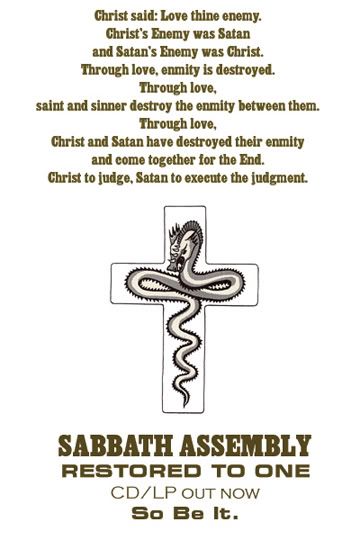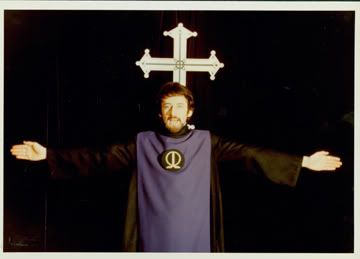Well, it was great seeing this project come together but how did it all come about? What was it that drew you to The Process and their views on the way to stabilize the essence of man? What are your personal religious views and how did that fit with this project?
Jex: There is so much about the Church that interests me - from the way it began, to their beautifully designed magazines, to the complex story of the woman behind it all. I relate to several of the teachings of The Process - teaching the importance of personal responsibility as a way to better navigate through life and teaching the value of self-unification. "LOVE SEX FEAR DEATH", a book recently published by Feral House, written by one of the Church's original members, is Timothy Wyllie's first hand account of what it was like to be a member of the Process. A member for roughly 14 years, I found his accounts very intriguing. Inside the book, were reprints from some of the original Process magazines (for which his book was named), photographs of members from all different chapters, and the sheet music to 3 original Process hymns. The Hymns themselves are very evocative, filled with imagery, and the melodies are beautiful. Many of them are praise songs to Christ, Satan, Lucifer and Jehovah all at once. This was something I had never come across before. The Process utilized these four deities to categorize the opposing sides of the self. We asked Timothy if he knew of any recordings that might exist and he said, to the best of his knowledge, they had never been recorded. With that, we began to conceive of "Restored To One". We played through the hymns (of which there are more than 60) to determine which of them felt like a good fit for us. We also contacted several original Process members, the ones we could find, and asked them which ones were their favorites. We continued whittling down the list of hymns until we settled on these. In connection with the release of the book, we were part of a recreation of an original Process Mass with the hymns set inside.
Xtian: I like the way you state your question: "...to stabilize the essence of man." One of the more important achievements of the Process Church was to point human beings towards an acceptance of their own wholeness. Traditional religious paths leave practitioners split, constantly measuring good vs bad, dark vs light, and thus caught in an ethical dichotomy. The stability the Process Church encouraged could be discovered only by taking an honest look at oneself, allowing for understanding of one's motivations and behaviors on the deepest level, peeling back the layers without fear or judgment based on a particular moral code and really learning about the self - which of course points the way to the Self. By means of this process one could move closer to the essence of humanity, and gain compassion for the instincts and intuitions of oneself and others - thus freeing us from the crippling cycle of self-judgment and judgment of others. This is the connection to my own personal religious view, which is that we all must be free of the mechanisms that weigh us down in anxiety, and these are most often moral....
You seem to believe strongly in the powers behind the hymns you have rePROCESSed, but what is it that you are trying to express with your creation? Do you believe that the teachings of The Process are needed more in our "got-to-have-it" now society than they were back when The Process was at it's prime? Does man need faith more now than back in the seventies?
Jex: Few people outside the Church had ever heard these hymns before.The ideas of the Process Church were unconventional and shocking in the late 60s/early 70's, but they are still pretty extreme even by today's standards. It was very important to us that our renditions maintain the authentic passion woven through them. My hope is that we were able to usher them into a place where their relevance can be felt today. To ignore our darker impulses is to remain blind to the truth. To take on shame for feeling these dark impulses is to punish ourselves for a thing that is natural. If an impulse is natural, whether or not to have that impulse is beyond our control. Therefore, we are best served if we make the choice to embrace all of the sides within us. This is not to say that we ought to act on all of our impulses simply because they are natural. Rather, it is to say that we are in control of how we choose to apply this knowledge to our daily lives. Acknowledging and comprehending personal responsibility is a timeless pursuit.
Xtian: It is difficult to assess how much faith people "need" in a given time because the outward display of faith has little to do with faith and more to do with performance. I think that we can know this answer only in the present moment by seeing what it is that we need as far as faith in our own lives; and what we feel will be similar to what others are feeling. We are existing now in a particularly empirical time characterized by a faith that the development of machines will move us towards a feeling of greater completeness. My intuition is that the vacuousness of this line of thinking is being exposed, and our faith will return to something invisible, something internal....
Xtian & Jex seem to be the core of the band with the rest of the members not as involved in the process of songwriting etc. As you have been using a variety of members in your live performances, will the line up that is now remain or will you continue changing members as needed?
Jex: We have been very fortunate to get to work with a number of talented musicians and have enjoyed having the freedom to play the hymns with these different groups of people and in a variety of different settings. It all helped to inform the sound. We hope to continue doing this.
 While you rePROCESS the hymns you seem to stay focused on the era they were created in. Is there a possibility with further rePROCESSing that you will perhaps venture beyond the musical realms you are in now or do you feel most comfortable with the Sabbath Assembly where you are now? Have you set any plans for the future concerning the band or will Sabbath Assembly be something you will work on sporadically without any haste?
While you rePROCESS the hymns you seem to stay focused on the era they were created in. Is there a possibility with further rePROCESSing that you will perhaps venture beyond the musical realms you are in now or do you feel most comfortable with the Sabbath Assembly where you are now? Have you set any plans for the future concerning the band or will Sabbath Assembly be something you will work on sporadically without any haste?Jex: It was quite an experience working on these hymns. I feel honored to have helped them come to light for new ears. As for future recordings, could be... and as far as to how those recordings might sound... the hymns on Restored to One sound the way they do because as we continued to play the hymns, we continued to allow them to change. The sheet music is fairly basic and the more we played through the hymns the more we connected with them, the more we were able to bring our authentic selves to the music. As the hymns grew to sound informed by the bits of ourselves that crept in, we made sure to allow the passion woven into them to inform us of what they wanted to sound like. If we record any more Process hymns in the future, I plan to keep with that style of working. The future of the band is open.
Xtian: We will continue to work with these hymns so long as we find in them a sentiment that mirrors our own personal growth. The hymns we chose for Restored to One all had an immediate resonance with an aspect of our lives, so slowly now we are beginning to read through additional hymns and feeling for that same spark of connection.
Sabbath Assembly
:AJNA:



No comments:
Post a Comment